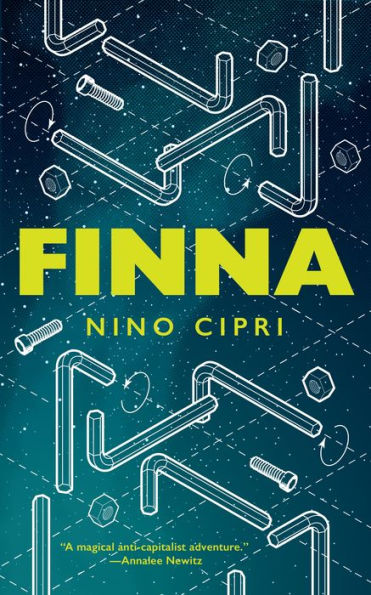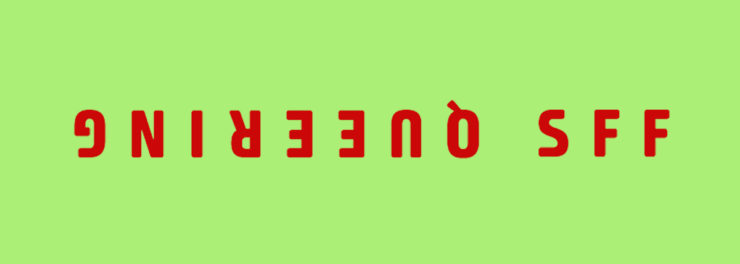To quote a favorite writer of mine, theorist José Esteban Muñoz: “The future is queerness’s domain.” There’s something about speculation, about the natural process of thinking but what if it was different, that lends itself to queer people’s art and artistry. He goes on to say, “Queerness is that thing that lets us feel that this world is not enough, that indeed something is missing. […] Queerness is essentially about the rejection of a here and now and an insistence on potentiality or concrete possibility of another world.”
Potentiality, futurity, and imagination set to the purpose of thinking about a better future, critiquing our present, and understanding our past. Sounds kind of like SFF as a genre, right?
The first post in the Queering SFF series went up on March 16th, 2010 and since then we’ve had almost one hundred installments—including a lot of reviews of queer SF that aren’t officially tagged in the series but are part of the ongoing conversation. We’ve talked about writing about sex, about violence and language, about comics and movies and novels (as well as the occasional outlier like a book of theory or poetry) by and about queer people. Along the way, linked series like Reading Joanna Russ and Reading Laurie J. Marks’s Elemental Logic have potentially snagged your readerly attention, as well.
Through the years, the series has gone through a few shifts here and there—but so have I, as the human behind the posts. For one thing, on a personal note, I was nineteen at the time I wrote that first installment on searching for and finding queer representation. Writing this one I’m a few months shy of thirty. The past ten years have spanned my entire adult life! I’ve written things I disagree with, in hindsight, and things I still find moving and purposeful. Essays and interviews and an absolute mountain of reviews later I’m still warmly attached to this series, and I’m also grateful to Tor.com for taking the shot at publishing it in a different environment with a total unknown back at the turn of the twenty-teens.
Plus, especially relevant to the whole writing about queer content beat: I’m using a different name and set of pronouns than I did back then, and have quietly but openly transitioned through understandings of my own gender in public. The words we use as a community have even changed over that span of time. In a semi-recent interview with The Advocate‘s LGBTQ&A Podcast, writer Jacob Tobia noted that they were really backing the horse on “genderqueer” being the term we went into the decade with around 2010, but then “nonbinary” rose to higher prominence. (To be honest, I still kinda miss genderqueer.)
So, where are we now and where are we going?
Well, the past decade has seen an absolute explosion of queer and trans writers in SF at all levels, from writers to editors to critics. Queer folks have snagged tons of nominations for our major awards and topped our recommendation lists and Best Ofs on the regular. There’s even a series here called This Book Queered Me, where authors discuss their big queer book moments! Just… so many more voices and perspectives, as well as the ever-evolving work of folks who’ve been here the whole time. Queering SFF isn’t even the most prolific place on this site where we talk about the field: just check out Liz Bourke’s Sleeps with Monsters series, which is also explicitly feminist in focus. Furthermore, that’s all happening alongside recognition of historical predecessors, such as Bogi Takács’s coverage of QUILTBAG+ Speculative Classics.
Buy the Book


Finna
While I often cast a look askance at the word diversity when it’s used without teeth, it’s useful to think about the many kinds of queer and trans writing the genre has to offer these days. In the past handful of years I’ve seen work from international writers, often in translation; writers from different economic and geographical backgrounds even inside the US or UK; Black, indigenous, and other writers of color; as well as writers from broad spectrums of gender identity, presentation, and embodiment. Having diverse perspectives and solidarity between writers from those (often very different!) backgrounds matters, a lot.
There’s no one queer story, or one lesbian story, or one gay story. There’s no single, solitary trans story. We often disagree, feel things differently, experience things in ways that clash, and sometimes are participant in another queer person’s oppression. The more voices we have, the better and richer our conversation is, and the more engagingly vital our imagined potential futures are. I also think I’ve seen a significant development in terms of the types of stories we get; young adult fiction has become a big contender in the past decade, for example. And, with the increase in opportunities and publishers spending their efforts on publicizing queer books, it’s possible to have painful books and silly books and “candy-reading” and deep drama at the same time.
I think a lot about the current-day queer nineteen-year-olds who are hungry to see themselves in their reading, the way I was when I wrote that first post. The way I still am, frankly, even hip-deep in a PhD program and reading way too much. While the world might be on fire, literally and metaphorically, the great work remains unfinished. Those kids still need books to read, and so do the people in their middle age, and so do our elders. One thing hasn’t changed for me over the past ten years, and won’t change going forward: I still believe art matters, and has an impact in shifting the world around us, little by little, in the ways I’ve seen over the past decade. It’s not perfect, but neither is it without real successes.
I still believe in those queer futures and our potential to imagine them beautifully, dangerously, brilliantly—together. So, here’s to another decade of Queering SFF! Tell me about your books, y’all, and let’s keep this ball rolling…
In the meantime, watch this space for the rest of the month: I’ll be revisiting some previous topics and posting some new discussions each week as we celebrate ten years of this column all month long!
Lee Mandelo is a writer, critic, and editor whose primary fields of interest are speculative fiction and queer literature, especially when the two coincide. They have two books out, Beyond Binary: Genderqueer and Sexually Fluid Speculative Fiction and We Wuz Pushed: On Joanna Russ and Radical Truth-telling, and in the past have edited for publications like Strange Horizons Magazine. Other work has been featured in magazines such as Stone Telling, Clarkesworld, Apex, and Ideomancer.











Thank you for starting this column. And yes, I agree with what you mentioned about the progress in the field. Ten years of the column. Almost twenty years of Lethe Press, and probably thirty+ years of my own attempts to write. A crazy, expansive road.
…then “nonbinary” rose to higher prominence. (To be honest, I still kinda miss genderqueer.)
I do as well. It defines the individual in positive relation to a concept, not negative rejection of one. I had a committed boyfriend when this column began who frequently snarled at people, “I’m NOT GAY!!” as he stood next to me holding my hand in public. I suggested saying “I’m bi” instead of “not gay,” but that never took.
I myownself define myself affirmatively as gay instead of “not straight” in rejection of that identity.
Wow, has it really been 10 years? I started following the Tor.com blog because of your series and have found so many amazing books that speak to me on a completely different level. I’ve sort of explored and defined myself through those reads, through that representation, and I thank you.
Oh, and I’m in total agreement – I kinda miss genderqueer too. :)
Is there a popular emphasis on “queer” meaning primarily lesbian/trans SF, or have I just not been finding SF with a gay (male) orientation?
@Steve, oldfan, Bob
Thanks for sticking with us this whole time!
@doug-jensen
There are quite a lot of gay characters & writers in sf, too! I think the past two or three years the more prominent or awards-listed books have been lesbian or queer-woman oriented… but back when this column started, the conversation was the reverse (“why so many queer men and so few queer women???”), so I think that does shift and change depending on the given publishing year. The answer overall is, I think: more of everything would do us well, because representation is low on all sides. In the upcoming “cool stuff from the past decade” columns we have coming up this month, there are books by &/or about queer men included as well.